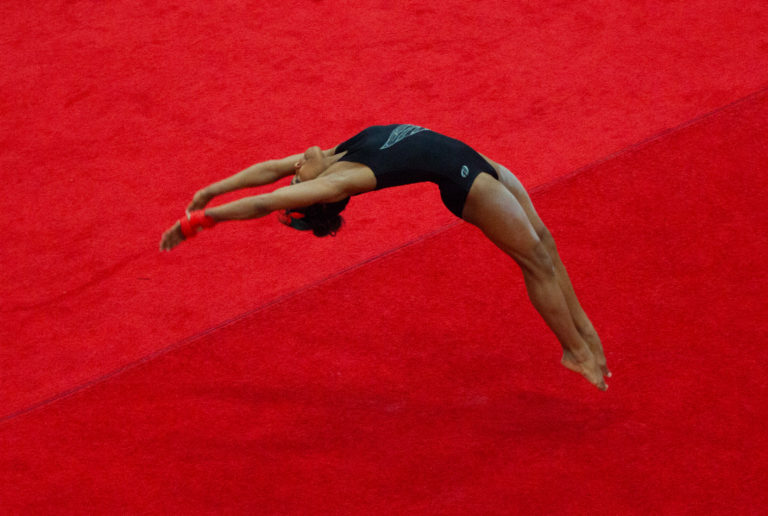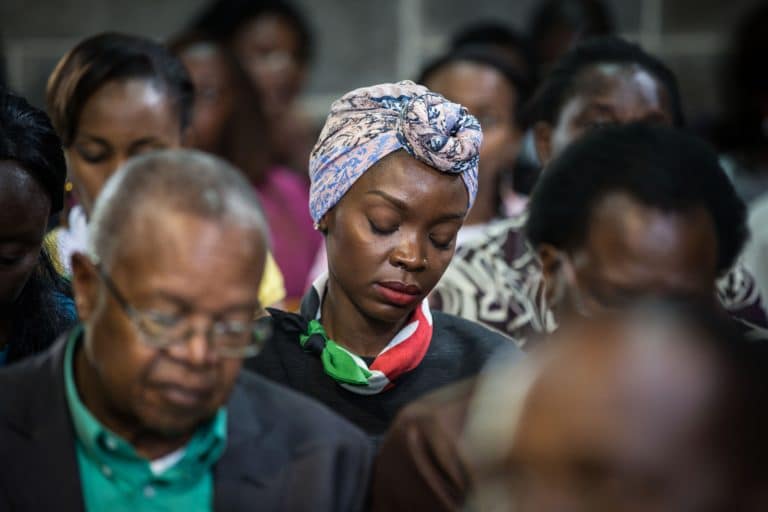
Image by James Thomas/Flickr, Some Rights Reserved.
The Wisdom of Shattering
When I was a young competitive gymnast, I remember the day I walked off the floor mat, sat down by myself at its edge, and began to contemplate quitting the sport. I was 12.
Gymnastics had been my life — the defining orbit of my childhood ambitions. But I was ever battling injuries, so much so that I was not only struggling to heal, but I was struggling to learn any new skills at all because I was so afraid of injuring myself again. I had had five casts for eight bone fractures in just four years. As soon as I got a cast off, worked through physical therapy, and built up my strength, another injury hit.
With so many injuries, I was becoming terrified in my little-kid mind of the worst injury I could imagine: breaking my neck.
Once, when practicing a release skill on the uneven bars, my coach had to catch me from falling. I had broken my elbow on this very move, so I was probably too tentative when I released the high bar to fly over, twist mid air, and catch the low bar. I held back. That’s what happens when we are afraid, yet forcing ourselves to go on: we get tense and tentative, which keeps our bodies from knowing how to fly.
My coach was furious with me that I had let my fear affect me. He looked at me and told me to walk to the bathroom, stare in the mirror, and thank God that I wasn’t a paraplegic. I would have been paralyzed the rest of my life, he screamed at me, if he hadn’t caught me. He had saved me from a life in a wheelchair, he said.

I did not entirely believe him, but I did as I was told. Covered in chalk, still wearing my grips for the bars, I walked to the gym bathroom that smelled of Lysol and old linoleum, stared in the mirror at myself, and thanked God I could still walk. I was shaking as I looked at myself, feeling so tiny and vulnerable, wearing my red-and-white-striped cotton leotard.
I lingered in the bathroom, creating for myself a few minutes of relief from facing my coach. In truth, I was far more afraid of my coach than I was of the skill, and I knew that. If my body was tense as I released myself between the bars, it was less about being in flight, and more about the weight of these toxic conditions.
It’s perhaps not surprising that one day I decided I’d had enough of both the sport and its accepted forms of emotional control. That was the day that I walked to the edge of the floor mat and sat down in the middle of gymnastics practice. Sitting down in our four-hour practices was unusual. But I needed for a moment to fathom my options. I remember trying to imagine, somehow, that it was OK to quit. It felt nearly impossible to even conceptualize quitting because I loved this sport and because my dreams were wrapped up in it.
But I was so exhausted. Too much compounded pain.
My coach noticed and came over. He got down on his knees, quietly. When he wasn’t furious with us he was fatherly, and now he was fatherly. He asked how I was. When I didn’t respond, he looked me right in the eyes and told me:
“Remember, you are only a failure if you quit.”
As I was getting up the courage to say “enough” out loud, to begin to even imagine saying “enough,” I was told that admitting limits is precisely how one fails. And if there has been a defining fear of my life, even more than incapacitating physical injury, it’s failing.
Failing and giving up have been inextricable in my mind ever since.

I have been thinking of late about the value of quitting, of giving up and saying “enough” in certain moments because we are simply hurting too much. Because we are exhausted. I don’t mean giving up on our dreams for good, but I do mean allowing ourselves room to be fractured. Allowing ourselves space to feel and step away, especially when we know something deep inside us needs to heal. Can stepping away from a goal also be, in some way, stepping toward? A different kind of movement, where we grow stronger into our own being, even as we grow into our dreams?
So many of us are told from an early age that the value is always in the striving, in never ceasing to persevere, in ever putting back together our broken pieces. We are told that we are strong if we disregard our fears and fight through the challenges, though our bodies scream for us to stop and rest and reevaluate the conditions in which we strive.
It is implied that we are successful if we stay the course in whatever we are invested. Perhaps that investment is a profession, a relationship, a religion, a moral code, or an image of ourselves. Or perhaps that investment is much bigger than any one person — like our collective investments in capitalism, or fossil fuels, or building up a military.
Quitting something and developing new imaginations is not a skill we often give much credit. But I wonder if, at some point, letting ourselves shatter could be our bravest act. Can a moment of giving up be that sacred turning point if we infuse it with faith? When we acknowledge that we have feelings, that we have limits, that we don’t have to be superhuman, that sometimes we experience things that do, indeed, for the time being, gut our capacity to go on — can these moments of recognizing our pain and limits be our most courageous ones?
In other words, what happens when we are simply too fractured? When we were never meant to be healthy in the current circumstances, anyway? When is giving up our current path opening ourselves to finding a path to health?
I am going on faith that one day, someday, I will heal enough to try again. But for today, I am listening to the shattering, feeling out what it means to give up, to grieve bravely my loss instead of just keeping on, to allow myself to be as I was: broken. To trust, perhaps, that giving up is not a failure, but a reorientation toward ourselves. And that the dreams we most seek after are the ones that move us into ourselves, into new places of healing, even as we catch flight.


